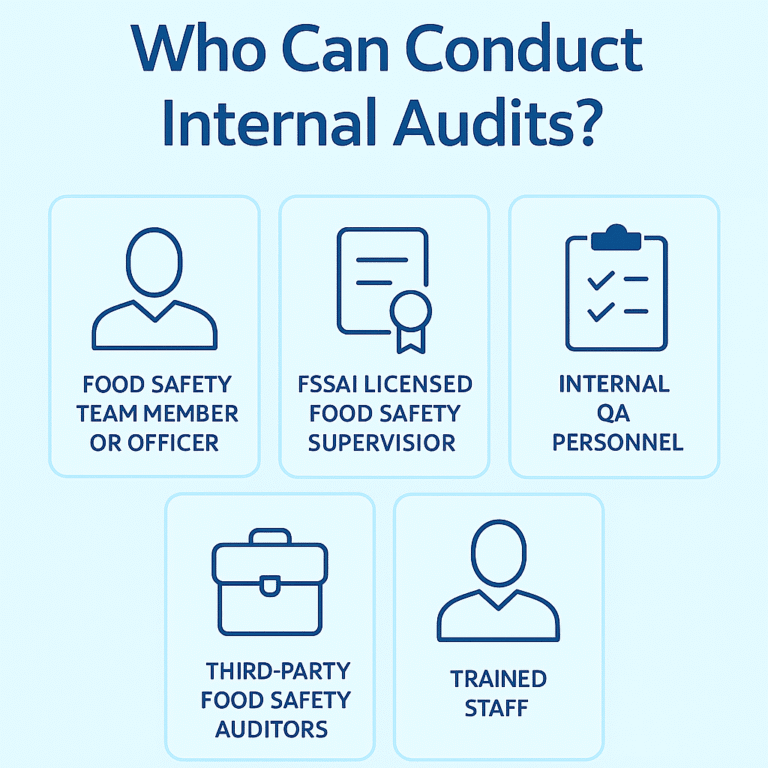What is Internal Auditing?
Internal auditing in FSSAI refers to a structured process where a food business operator (FBO) evaluates their own compliance with food safety regulations laid down by the Food Safety and Standards Authority of India (FSSAI). This self-assessment ensures that food handling, processing, packaging, and distribution practices are safe, hygienic, and legally compliant.
By conducting an internal food safety audit, businesses can proactively identify and rectify gaps before external inspections, ultimately supporting smooth operations and long-term sustainability.
Why Internal Audit is important for Food Business?
An internal food safety audit helps in:-
Ensuring FSSAI compliance and avoiding penalties or license suspension
Implementing effective Food Safety Management Systems (FSMS)
Identifying food safety hazards and risks early
Improving hygiene, documentation, and staff training
Preparing for external food safety audits or inspections
What is Checked in an Internal Audit?
A typical FSSAI internal audit checklist includes:-
Premises and plant hygiene
Raw material handling and storage
Good Manufacturing Practices (GMP)
Pest control and sanitation
Employee hygiene and training
Labeling, packaging, and traceability
Review of FSMS documentation and SOPs
These checks ensure your business is ready for any third-party food audit or regulatory visit by FSSAI.

How Often Should Internal Audits Be Done?
Food businesses should conduct internal audits at least twice a year. However, for high-risk categories like dairy, meat, bakery, and ready-to-eat food products, quarterly internal audits are recommended to ensure ongoing food safety compliance. Regular internal food audits help maintain FSMS (Food Safety Management System), identify non-conformities early, and stay prepared for FSSAI inspections or third-party food audits. In today’s fast-evolving food industry, routine internal audits are essential not just for regulatory adherence but also to maintain consumer trust, ensure food hygiene standards, and avoid legal or business disruptions. Implementing a risk-based audit frequency aligned with your operations is now a key part of effective FSSAI audit readiness strategy in 2025.
Benefits of Conducting Internal Audits
Internal audits help prevent food contamination, ensure legal compliance, improve operational efficiency, and enhance brand credibility. They are a critical part of a strong food safety culture.
Minimize the risk of food contamination
Ensure regulatory compliance
Build brand trust and customer confidence
Enhance product quality and hygiene
Stay prepared for external audits and FSSAI inspections
FAQ's
Q1: What is internal auditing in FSSAI?
A: Internal auditing in FSSAI is a structured self-inspection process conducted by food businesses to ensure compliance with FSSAI food safety regulations, hygiene standards, and documentation requirements.
Q2: Is internal audit mandatory for food businesses under FSSAI?
A: While not always mandatory, internal audits are highly recommended by FSSAI, especially for licensed manufacturers, high-risk food categories, and export units. In some sectors, they are a legal or certification requirement.
Q3: How often should internal audits be done?
A: As per FSSAI’s best practices in 2025, food businesses should conduct internal audits bi-annually or quarterly, depending on the risk level and size of the operation.
Q4: Who can conduct an internal food audit?
A: Internal audits can be conducted by a trained Food Safety Supervisor (FoSTaC certified), internal quality team, or an external FSSAI-approved food safety consultant.
Q5: What is included in an FSSAI internal audit checklist?
A: It includes checks for plant hygiene, employee hygiene, raw material handling, storage, labeling compliance, SOP documentation, and pest control practices.
Q6: What are the benefits of conducting internal audits?
A: Internal audits help maintain FSSAI compliance, reduce food safety risks, improve process efficiency, avoid legal penalties, and build consumer trust in your brand.
Q7: Can small food businesses skip internal audits?
A: Even small FBOs benefit from internal audits as they help in early detection of issues and support basic compliance, especially if the business plans to grow or export.
Q8: How do internal audits support FSSAI inspections?
A: Internal audits prepare businesses for regulatory inspections, reduce chances of non-compliance, and ensure that all food safety documentation and practices are up-to-date.
